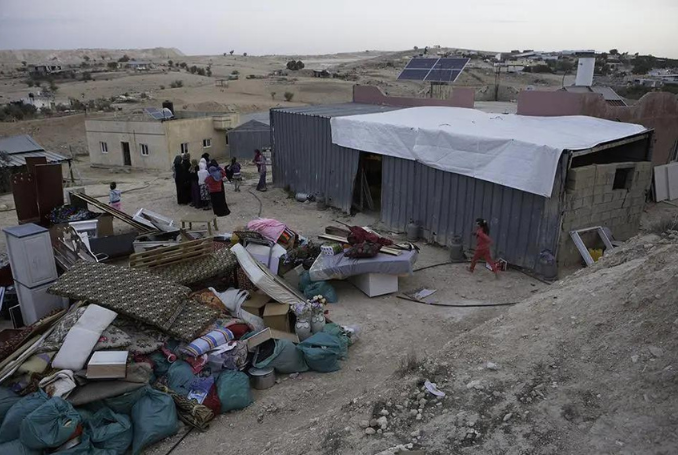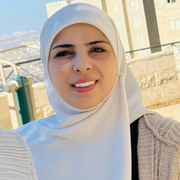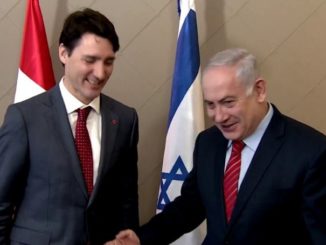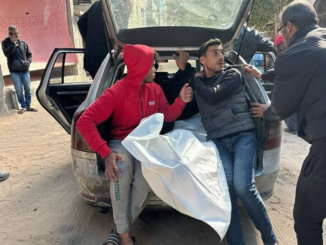
They left behind their homes with everything in them and were not able to return, not even to collect their belongings. Anyone who dared to go back was beaten, arrested, or had his vehicle burned.
Abu Najeh al-Omari is an 80-year-old Palestinian man.
He spends most of his time crying and bemoaning that he and his family were forced to leave their Bedouin community east of Ramallah.
“We dream about it day and night,” he told The Palestine Chronicle.
Several months ago, a group of illegal Jewish settlers, protected by the Israeli army and police, forced him and his family to leave their house and their land.
Al-Omari has lived in the Ain Samia area since the 1960s. It is a vast, beautiful land surrounded by mountains, rich in water springs, and characterized by a particularly fertile soil.
Al-Omari, a father of eight children, worked as a farmer and breeder.
His family was one of the dozens that formed a Bedouin community, which gained a prominent place in Palestinian society.
Constant Oppression
According to al-Omari, for decades, the Israeli attacks against them have never ceased.
He told us that since 1967, Bedouin families in the area have been subjected to harassment and assaults, whether at the hands of Israeli settlers or soldiers.
“From time to time, they would steal our livestock and prevent us from grazing them in several areas, sometimes under the pretext that it was a military zone, and sometimes that the grazing areas were under the control of the Israeli state, and sometimes under the pretext that they were close to the settlements,” he lamented.
“But we came here long before the settlements were built,” he added.
These restrictions, however, deepened the relationship between the Palestinian population and this land. The population has grown, and they began to cultivate the land with various crops in order to diversify their sources of livelihood.
Five years ago, Israel began to tighten its grip on them, preventing them from building barns for their sheep or to add rooms to their houses, in order to accommodate a growing population.
“Every time I built a small room, the Israeli army demolished it,” he said.
“We built a modest school, but the settlers smashed its windows and cut its water pipes. Every Palestinian in this area is at risk of having his home demolished under any pretext they choose,” he added.
‘Youth of the Hills’
With time, a group of settlers, who call themselves ‘Youth of the Hills’, began practicing pastoral settlement in the Ain Samiya area. The settlers brought their livestock, prevented the Palestinians from grazing, and gradually seized their lands.
Last year, the frequency of Israeli attacks on this Bedouin community doubled. Israeli settlers and soldiers worked together to expel families through non-stop assaults.
Beating residents, throwing stones at homes, constant cursing, cutting off water and electricity supplies, stealing livestock, burning and vandalizing agricultural crops: all came as part of an intense wave of attacks, which aimed, from the beginning, to forcibly remove the Palestinians.
“They stole 30 heads of livestock from me, claiming they were theirs, and stole dozens more from the rest of the families,” al-Omari said.
“We were afraid they would steal them all, so we had to leave the community to more distant areas, and so far, we have not been able to return”.
Thirty-seven families, each consisting of seven to ten people, most of them children, were forced to leave their homes in the Ain Samiya area under intense pressure from Israel, in the form of relentless attacks by Jewish settlers, Israeli army and police.
They left behind their homes with everything in them and were not able to return, not even to collect their belongings. Anyone who dared to go back was beaten, arrested, or had his vehicle burned.
“We used to get our livelihood from livestock and agriculture, but now we live on aid. We do not live together as a community anymore. Every family was forced to live in separate villages and to sell their livestock. Every day, I wish to return to Ain Samiya.”
‘They Burned My House’
Waad Salama, 37, has been living in the Wadi Alsharq Bedouin community, east of Hebron (Al-Khalil), for ten years. She moved there after she got married.
Last November, she heard the sound of footsteps near the house. When she went out to investigate, she caught four masked settlers pouring inflammable liquid and setting the house on fire.
“I started screaming but my husband was not there,” Salama told The Palestine Chronicle.
“I quickly grabbed my four children from the house and we managed to run away before getting harmed. But the house and everything in it turned to ashes despite the neighbors’ attempts to extinguish the fire,” she continued.
Salama and her family were forced to live in a small rented room in the neighboring town of Sa’ir under very difficult financial circumstances, as they had lost all of their savings due to the fire.
The burning of the house was not the first incident in this community. Almost daily, Palestinians record various attacks from settlers who want to force them to leave.
“They came every night and threw stones at us, protected by the Israeli army,” Salama said. “They destroyed everything, they cut the electricity and water pipes to make our lives more difficult.”
‘Genocide against Bedouin’
According to the Palestinian Central Bureau of Statistics, 25,000 to 30,000 Bedouins live in the West Bank.
The Bedouin way of life is now threatened by the severe restrictions on their freedom of movement imposed by Israel. According to the center, their presence hinders Israel’s settlement plans in the West Bank.
Al-Baidar Organization for Defending Bedouin Rights monitored, during last October alone, the deportation of ten Bedouin communities from the areas of Ramallah, Nablus, Hebron, Jerusalem, and the Jordan Valley.
Hassan Malihat, the organization’s general supervisor, told the Palestine Chronicle that Israel is committing genocide against the Bedouin communities in the West Bank.
The Bedouin presence in the West Bank is concentrated in the eastern deserts, specifically in the areas east of Ramallah and Jerusalem, in the Jordan Valley area, in the Jericho and Tubas areas, as well as south of Hebron.
The latter is classified as “Area C” under the Oslo Accords. Therefore, it is subject to the security and administrative control of Israel.
“These lands are the backbone of the implementation of Israel’s settlement projects, and the Bedouin presence in these areas is considered a real obstacle to the implementation of these projects,” Malihat said.
“Therefore, the policy of ethnic cleansing is practiced by demolishing homes, confiscating property, and forcibly displacing the local population, using illegal and racist means.”
Israel uses all means available, including confiscation of land, expelling Bedouin residents, relocating them to geographically defined areas, destroying and vandalizing Bedouin property and facilities; and declaring their land as nature reserves or closed military zones where grazing is prohibited.
According to Malihat, there are also other expulsion methods that Israel employs to create a difficult environment, which eventually forces the Bedouin communities to leave. They are deprived of basic services, especially drinking water, electricity, and transportation routes.
“All these acts are carried out in violation of all international laws, agreements and treaties, most notably the four Geneva Conventions of 1949, the Hague Convention relating to the peaceful settlement of international disputes and the Convention on the Rights of the Child of 1989,” Malihat explained.
“There is no clause in the Charter of the United Nations that has not been blatantly violated by the occupying state,” he concluded.
(The Palestine Chronicle)

– Fayha’ Shalash is a Ramallah-based Palestinian journalist. She graduated from Birzeit University in 2008 and she has been working as a reporter and broadcaster ever since. Her articles appeared in several online publications. She contributed this article to The Palestine Chronicle.








For Palestinian activists in Europe or North America, I would suggest asking the local law courts for an advisory opinion on whether or not such activity constitutes terrorism as defined in (for the US) the FBI website https://www.fbi.gov/investigate/terrorism or in Europe the local equivalent. Using John Doe and Jane Doe as the victims’ names, of course. Then when the law court agrees that these actions constitute terrorism, work on the local democratic representatives to get the laws on terrorism enforced, including the ones on preventing material support for terrorists.